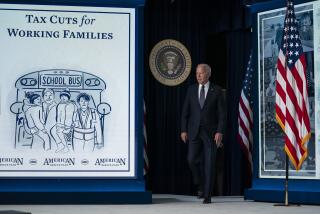Gore Touts Family Tax Credits
- Share via
WASHINGTON — Shifting his focus to families, Vice President Al Gore Thursday proposed a combination of tax credits and increased federal spending to expand the availability of after-school programs.
Gore, speaking at a YMCA in Nashville, said his proposal would provide care to more than 10 million children during the weekday hours of 3 to 7 p.m. when, studies show, children face the greatest risk of violence.
Separate studies have also shown that children left unsupervised after school are more likely to commit crimes, suffer academically and abuse drugs or alcohol.
“Government doesn’t raise children, families do,” Gore said. “No policy can teach a child right from wrong. . . . But we can make it easier, not harder, to be a strong family.
“If I’m entrusted with the presidency, that’s exactly what I’ll do,” Gore said.
Specifically, Gore proposed spending $11.3 billion over 10 years to increase funding for expanded after-school and summer school programs nationwide. Just under half the sum would go to subsidize a new refundable child- and dependent-care tax credit for families with children ages 6 to 16. The rest of the money would be used to build on existing programs and create an “after-school quality fund” to recruit and train staff.
Gore would also encourage schools to stay open late, providing facilities for expanded after-hours care.
Under Gore’s plan, schools would be given greater flexibility to use building improvement funds as an incentive to remain open past normal hours.
Jon Schnur, an education advisor to the vice president, said Gore’s overall plan seeks to emphasize parental “choice” by providing up to a 50% credit for after-school care, as well as freedom for schools and parents to select the after-school provider they want to bring into their children’s classrooms.
“The philosophy here is trying to help communities to create a new system and new markets” that will extend the availability of quality after-school care by giving parents the means to shop for the kind of care that suits their needs, Schnur said.
The $11.3 billion falls under Gore’s previously announced budget plans, allocating $250 billion of the projected federal surplus over 10 years to targeted tax cuts and $115 billion to increased education spending.
After spending a good part of the past month or so bashing Texas Gov. George W. Bush on Social Security and other issues, Gore plans a shift in focus over the next week, instead laying out his own agenda on issues of concern to working families.
Although some fellow Democrats have grumbled that Gore has seemed too negative of late, aides insisted the vice president was moving on his own timetable and not recalibrating his strategy.
“Bush was rolling out some moderate-sounding proposals to redeem himself from his disastrous Bob Jones [University] visit,” said Doug Hattaway, a Gore spokesman.
“It was certainly appropriate to draw the distinction between our approach on health care and education issues,” Hattaway said. “Now I think it’s sort of a natural rhythm that we’ll be rolling out our piece.”
After the speech unveiling his after-school proposals, Gore attended a session with state Democratic Party chairmen gathered in Nashville for their regular meeting, and then headlined a party fund-raiser expected to raise roughly $1 million.
More to Read
Get the L.A. Times Politics newsletter
Deeply reported insights into legislation, politics and policy from Sacramento, Washington and beyond. In your inbox twice per week.
You may occasionally receive promotional content from the Los Angeles Times.










